

(By Mo Tingting)Apart from picturesque landscapes, Dehong Dai and Jingpo Autonomous Prefecture also boasts hospitality ethnic groups and dynamic festivals. As one of the most beautiful places, Dehong is home to many minority groups including Dai, Jingpo, and Achang who leads a simple and peaceful life. Traditions such as Achang's primitive customs like knife-forging and Aluwoluo Festival endow Dehong with diverse ethnic cultural heritages. Please come and share your days to savor the life of Achang people in an old-fashioned way.
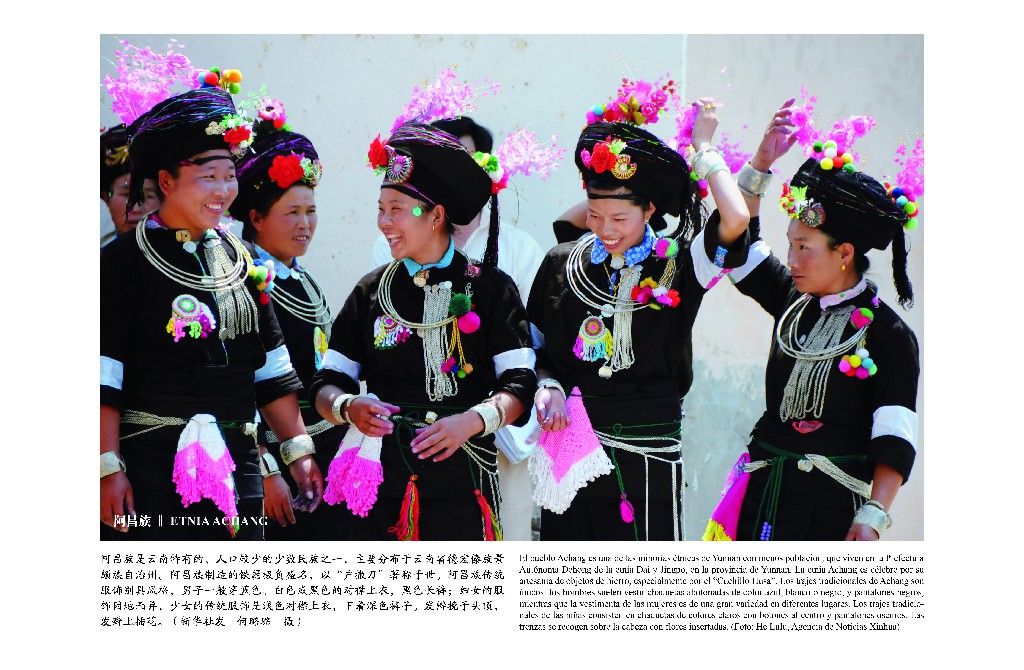
Cultural inheritance through storytelling
The Achang is one of 56 officially recognized ethnic groups in China, mainly residing in the Dehong Dai and Jingpo Autonomous Prefecture of west Yunnan Province, around the southern tip of the stunning Gaoligong Mountain.
The Achang speaks a language of the same name, which falls under the Burmish branch of languages. It does not have its own writing system. Storytelling has long held an important place in Achang society. Through ballads and epic poetry, the Achang relates the folk legends of their people to the younger generation.
Though the Achang remains one of the lesser-known minority groups today, they are considered some of Yunnan’s earliest inhabitants. They are believed to have descended from the ancient Qiang tribe, a group of nomadic people that migrated southward from the Qinghai-Tibetan Plateau around the third century and gave rise to numerous ethnic groups across southern and southwestern China. Achang people have long intermixed with other local ethnic groups.
Before Chinese imperialism reached Yunnan, a series of kingdoms and local dynasties ruled the diverse southern lands. The Achang served as vassals to two of the most powerful ones, the Nanzhao Kingdom (738-902) and the Dali Kingdom (937-1253). Until the 16th century, the Achang was conflated with the Jingpo, though the two have always been separate people groups. Like the Jingpo, however, the Achang would come to fall under China’s imperial “Tusi”, or “chieftains” system by the time of the Ming (1368-1644) and Qing (1636-1912) dynasties.
Situated on the southern tip of the Gaoligong Mountain, the area peopled by the Achang has a warm climate, vast fertile land and innumerable watercourses, which all give rise to the prosperity of agriculture. The Achang people are proud of their quality rice and can make many kinds of delicious food from it.
Achang men tend to wear blue, white or black jackets that button down the front. The men always take their bags and machetes with them wherever they go. Achang women like to wear silver objects on festive occasions.
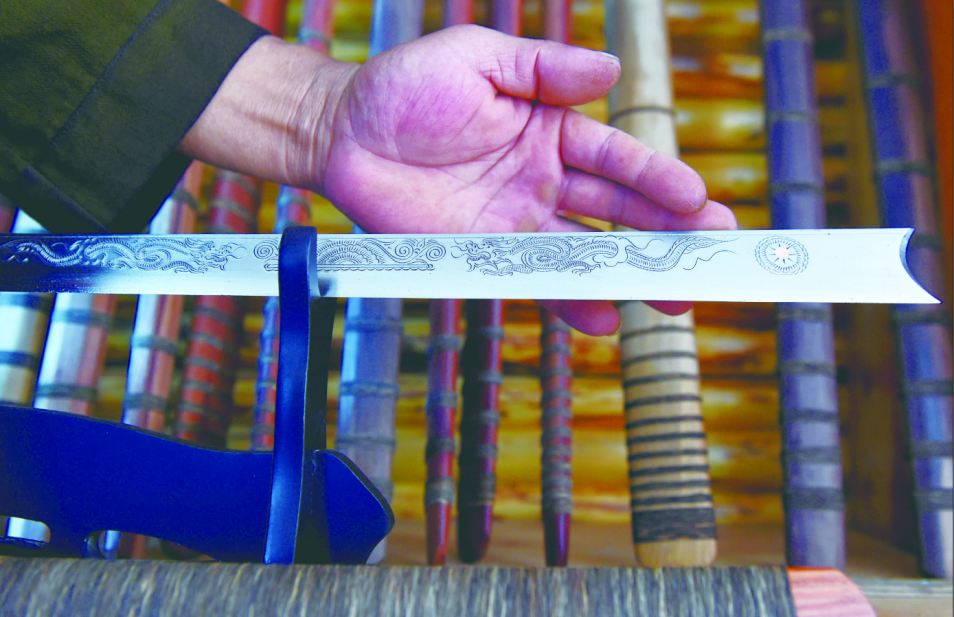
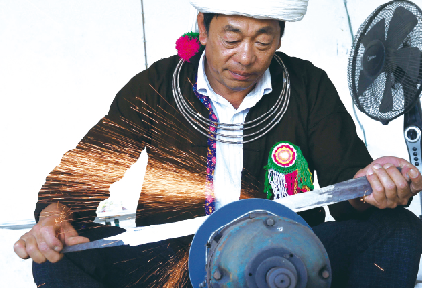
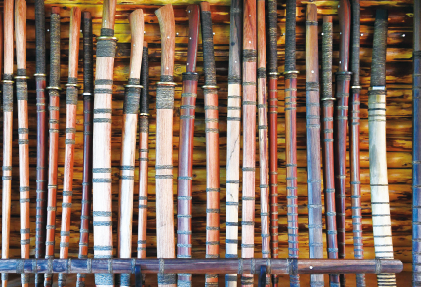
Their handicraft industry is highly developed, boasting rich traditions. They are adept at forging iron. In fact, almost every family can do it. Their "Achang Knife" or "Husa Knife" is a long-famed handicraft. This sort of knife is well-forged and elaborately made, and very sharp, tensile and durable, enjoying a high reputation among the people in the
Tips
Religion: Most Achang people are Theravada Buddhists with animistic characteristics. Many of their festivals are based on such beliefs. Nearly in every village, a Buddhist temple stands with various architectural styles.
Husa Knife: It gets its name because the Achang people began their forges in Husa Town of Longchuan County in Yunnan Province.
A feast of music and delicacies
When Achang’s festivals come, there will be a feast of songs, dances and delicacies. Thanks to the influence from the Dai, the Achang also celebrates many Dai festivals, namely the Water Splashing Festival, whose origins center around the ritual “bathing of the Buddha”, and thus involves running around with water guns and buckets. With cheer, hail and hurrah, they go to rivers to wash and bathe their Buddha. In common with the Dai ethnic minority, the Water-Splashing Festival is the best opportunity for Achang young people to choose a mate for life.
Apart from the Water Splashing Festival, on February 4th by the lunar calendar, the Achang hold the Aluwoluo Festival to pay homage to the ancestors who made great contributions to the development of the ethnic group.
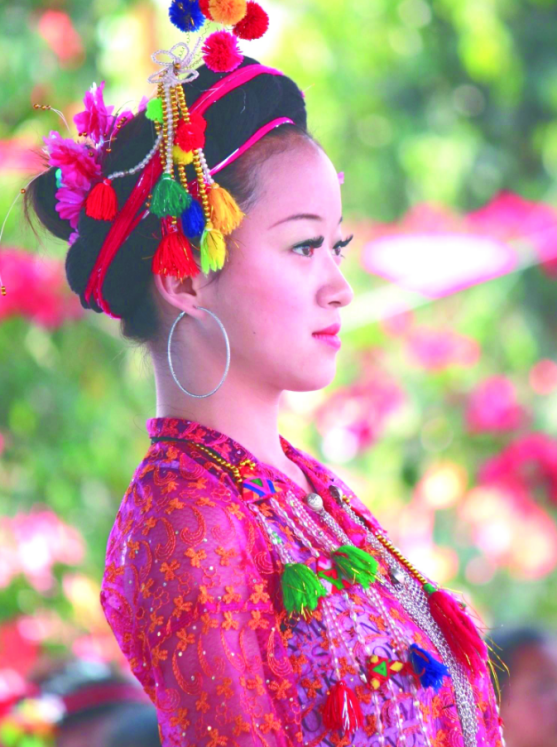
Aluwoluo Festival is the grandest annual event for the Achang People. “Aluwoluo” literally means “celebrations around houses” in the Achang language. It originated from a kind of ancient religious ceremony for God of Heaven (Zhepama) and Goddess of Earth (Zhemima).
On that day, people will slaughter swine and cattle for the sacrifice in order to pray for a bumper harvest as well as drive away pests and disasters. If the boa can be caught on the very fete day, it is considered as an auspicious sign. It is a time to commemorate the historic achievements of their ancestors and pray for a new life of happiness.
Before the festival, all the men, women and children in the village should choose a straight chestnut tree as a sacred tree on the mountain. After the venerable old man presided over the sacrifice, the tree could be cut down. After the sacred tree arrived at the sacrificial field in the village, the sacred tree was set up, and a sacrificial platform was built around the sacred tree. During the festival, they erect statues of dragons and elephants on a square, representing good luck. A bow and arrow are designed on the top of the statues with the arrow pointing up into the sky, symbolizing that Zhepama shot the false sun made by a demon named Lahong. Besides, while a blue dragon and white elephant stand for auspiciousness.
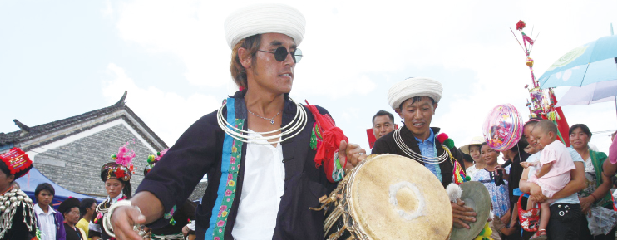
The opening of the festival will be followed by a jubilant dance named Aluwoluo to express their deep gratitude to their ancestors. Subsequently, various artistic activities are carried out successively until the end of the ceremony. Achang members will get attired in their gorgeous costumes and get together near the open-air stage to sing and dance, and treat guests with delicacies, accompanied by the sound of firecrackers that resounded through the whole household. The festival is carried through under an atmosphere of piety, pleasure and auspices.
This period is a time for young men to pursue love and companionship. In some places, groups of young men and women gather around a bonfire, where couples flirt by singing alternate verses. From this, many touching love stories and countless blissful marriages have been achieved.
Tips
Aluwoluo Festival: A common belief about the origin of this festival is that in ancient times Zhepama created the sky while Zhemima created the ground, henceforth, people lived and worked in peace. However, the enemy Lahong created a fake sun which destroyed people’s happy and peaceful life. For the survival of everything in the world, Zhepama and Zhemima have shot down the sun and defeated the Lahong, then everything went back to peace again.
Source: China-ASEAN Panorama
桂ICP备14000177号 Copyright@2006-2013 Guangxi China-ASEAN Panorama Magazine Agency Co., Ltd. All Rights Reserved